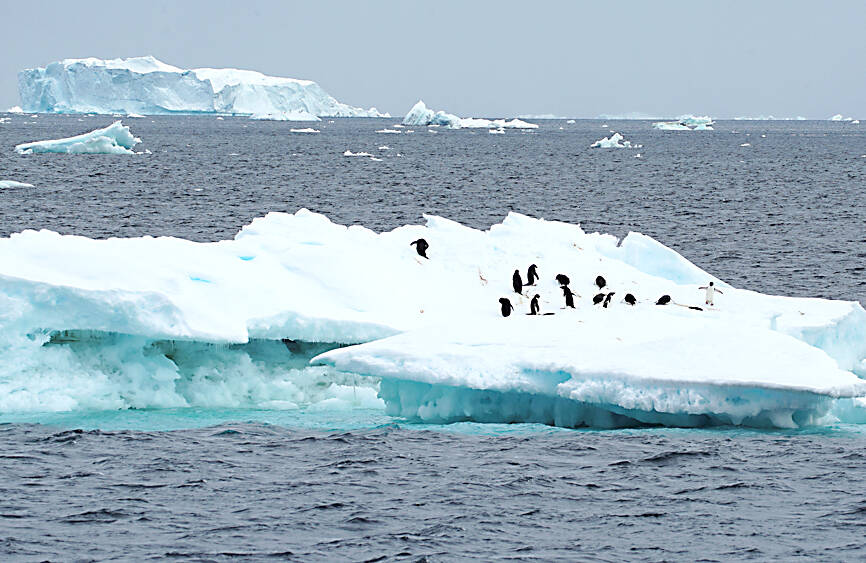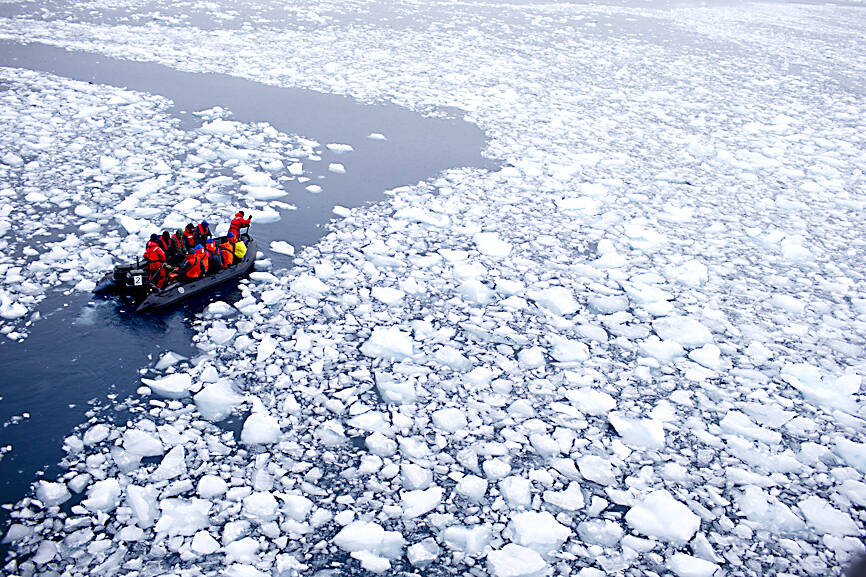Sea ice in the antarctic region has fallen to a record low this year as a result of rising global temperatures and there is no quick fix to reverse the damage done, scientists said yesterday in a new study of the impact of climate change on the continent.
The continent’s minimum summer ice cover, which last year dipped below 2 million square kilometers for the first time since satellite monitoring began in 1978, fell further to a new low in February, a study published in the journal Frontiers in Environmental Science said.
“It’s going to take decades if not centuries for these things to recover. There’s no quick fix to replacing this ice,” said Caroline Holmes, polar climate scientist at British Antarctic Survey and one of the study’s coauthors.

Photo: Reuters
“It will certainly take a long time, even if it’s possible,” she told a briefing with journalists.
This year’s sea ice minimum is 20 percent lower than the average over the past 40 years, equivalent to a sea ice loss nearly 10 times the area of New Zealand, said Tim Naish, director of the Antarctic Research Centre at New Zealand’s Victoria University of Wellington, who was not a participant in the study.
“In some cases we are getting close to tipping points, which once crossed will lead to irreversible changes with unstoppable consequences for future generations,” Naish said.

Photo: AP
Global warming driven by the burning of fossil fuels has made Antarctica more vulnerable to extreme events and the impact is “virtually certain” to get worse, the study said.
Climate change would “lead to increases in the size and frequency” of heat waves, ice shelf collapses and declines in sea ice, it said, drawing on recent evidence from scientific studies of the antarctic ocean, atmosphere, cryosphere and biosphere.
The precise impact of climate change on Antarctica and the surrounding ocean has been uncertain and scientists have struggled to measure how much global warming is affecting the thickness of antarctic ice.
However, from phenomena such as the rapid decline in sea ice, it is “scientifically reasonable” to assume that extreme events are going to intensify as global temperatures rise, said Martin Siegert, a glaciologist at the University of Exeter and another coauthor.
Last year, an “atmospheric river” originating from Australia drove subtropical heat and moisture into the continent, causing unprecedented temperatures up to 38.5oC above normal, the largest variance from the norm the world has ever experienced.
Siegert described the temperature increase as “absolutely astonishing,” adding that if it had occurred during the Antarctic summer, instead of winter, it would have triggered melting on the surface of the East Antarctic ice sheet, which has so far been spared from melting.
“Antarctica is fragile as an environment, but extreme events test that fragility,” he said. “What we’re deeply concerned about is the increase in intensity and frequency of extreme events and the cascading influences that they have in other areas.”

AIR SUPPORT: The Ministry of National Defense thanked the US for the delivery, adding that it was an indicator of the White House’s commitment to the Taiwan Relations Act Deputy Minister of National Defense Po Horng-huei (柏鴻輝) and Representative to the US Alexander Yui on Friday attended a delivery ceremony for the first of Taiwan’s long-awaited 66 F-16C/D Block 70 jets at a Lockheed Martin Corp factory in Greenville, South Carolina. “We are so proud to be the global home of the F-16 and to support Taiwan’s air defense capabilities,” US Representative William Timmons wrote on X, alongside a photograph of Taiwanese and US officials at the event. The F-16C/D Block 70 jets Taiwan ordered have the same capabilities as aircraft that had been upgraded to F-16Vs. The batch of Lockheed Martin

GRIDLOCK: The National Fire Agency’s Special Search and Rescue team is on standby to travel to the countries to help out with the rescue effort A powerful earthquake rocked Myanmar and neighboring Thailand yesterday, killing at least three people in Bangkok and burying dozens when a high-rise building under construction collapsed. Footage shared on social media from Myanmar’s second-largest city showed widespread destruction, raising fears that many were trapped under the rubble or killed. The magnitude 7.7 earthquake, with an epicenter near Mandalay in Myanmar, struck at midday and was followed by a strong magnitude 6.4 aftershock. The extent of death, injury and destruction — especially in Myanmar, which is embroiled in a civil war and where information is tightly controlled at the best of times —

China's military today said it began joint army, navy and rocket force exercises around Taiwan to "serve as a stern warning and powerful deterrent against Taiwanese independence," calling President William Lai (賴清德) a "parasite." The exercises come after Lai called Beijing a "foreign hostile force" last month. More than 10 Chinese military ships approached close to Taiwan's 24 nautical mile (44.4km) contiguous zone this morning and Taiwan sent its own warships to respond, two senior Taiwanese officials said. Taiwan has not yet detected any live fire by the Chinese military so far, one of the officials said. The drills took place after US Secretary

THUGGISH BEHAVIOR: Encouraging people to report independence supporters is another intimidation tactic that threatens cross-strait peace, the state department said China setting up an online system for reporting “Taiwanese independence” advocates is an “irresponsible and reprehensible” act, a US government spokesperson said on Friday. “China’s call for private individuals to report on alleged ‘persecution or suppression’ by supposed ‘Taiwan independence henchmen and accomplices’ is irresponsible and reprehensible,” an unnamed US Department of State spokesperson told the Central News Agency in an e-mail. The move is part of Beijing’s “intimidation campaign” against Taiwan and its supporters, and is “threatening free speech around the world, destabilizing the Indo-Pacific region, and deliberately eroding the cross-strait status quo,” the spokesperson said. The Chinese Communist Party’s “threats